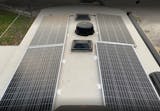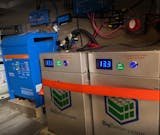It can be a pain to find the right size battery for your boat. Similar to clothes, there is no “one size for all” for boat batteries. (on the other side, although “one size” items do exist, it is true that they can’t fit everyone.) Different battery size is required for massive variety of boats, such as: sail boats, center console, pontoons, bass boats, kayaks, and many others.
Now let’s talk about why it is important to choose the right battery size. Since every boat is different, their needs will be different as well. Boat batteries are specifically used to optimize the performance of your boat, smoothen the trolling motor, and power device such as fish finder or your GPS. You will not run out of power or damage any equipment if you choose the right battery size for your boat.
Battery Size Basics
A frequently asked question when choosing your batteries or upgrade your existing batteries is “what size battery fits best with my boat?”
As we know, this question is likely to be answered by boat dealers, and they can even help you choose the best fit, However, if you want to add more equipment on your boat, you may need a more powerful battery. Under circumstances like this, you are the only person to make the best call.
What Types Of Batteries Do You Need?
First of all, a starting or cranking battery is needed to start the main engine. Then, for the trolling motor and other electronic accessories, you will need a deep cycle battery to power them. If there are dual engines you will need to add another deep cycle battery.
Luckily, the dual-purpose battery can do both jobs. However, according to most experts, the dual-purpose battery usually has poor performance. It’s better to avoid choosing dual purpose if there is enough space for more than one battery.
How Much Amperage Do You Need?
Now it’s time to show the data. We know the mathematical part is not going to be pleasant, but trust us, you don’t want to miss this part if you want to enjoy more your finishing trips. Therefore, it’s important to calculate the correct AH (amp hours) to operate the vessel.
There is an Ah(amp hours) rating for batteries. This can measure the actual battery capacity. For instance, if a battery is rated 100Ah, it can deliver 100 amps for one hour or 5 amps for 20 hours. However, batteries shouldn’t be discharged past 50% of their capacity.
Energy Audit can be conducted so that it’s easier to see if the battery size can meet the energy demands of your equipment.
Now let’s see how Energy Audit works.
Using the formula W=AV, which means amperage multiplied by voltage. Then if you want to know the number of amps, you just need to do some simple math: divide the wattage by the system voltage. Here is an example, if there is a 6 watt light bulb in a 12 volt system, the amps will be 0.5. And the light bulb will consume 5Ah if it is used for 10 hours a day. Normally, trolling motors will consume 5 to 30 amps per hour, which means it’s important to have a battery setup that offers 30 to 200 amp per hour.
Lastly, based on the sum of average amps per hour that your equipment consumes, you will find the battery with the correct amps.
If your boat already has a battery? Don’t worry, you can easily check the specs and replace it with a similar battery that match or exceed the original battery. Therefore, upgrading to lithium battery is highly recommended.
Frequently Asked Questions (FAQs):
Q. Are dual-purpose batteries any good?
A. According to most experts, the dual-purpose battery usually has poor performance. It’s better to avoid choosing dual purpose if there is enough space for more than one battery.
Q. How many marine batteries do I need?
A. A starting or cranking battery is needed to start the main engine. Then, for the trolling motor and other electronic accessories, you will need a deep cycle battery to power them. If there are dual engines you will need to add another deep cycle battery. You should consult with the boat dealer or lithium battery supplier before buying the batteries.
Q. What is the life expectancy of LiFePO4 batteries?
A. Depending on the brand and size, lithium batteries last between 1,000 and 5,000 cycles, giving ten years or more of useful life. They provide about 70% capacity after their initial life cycle.


















